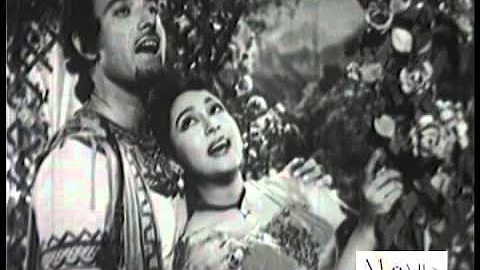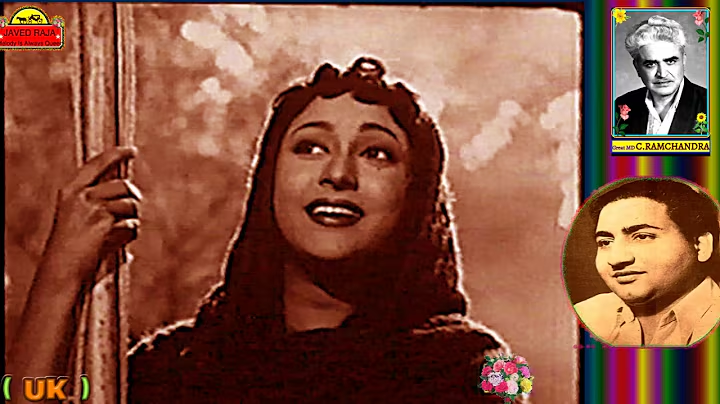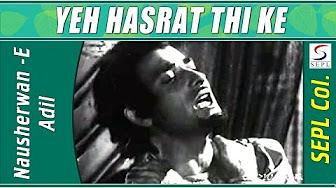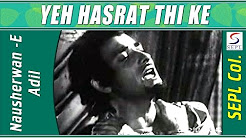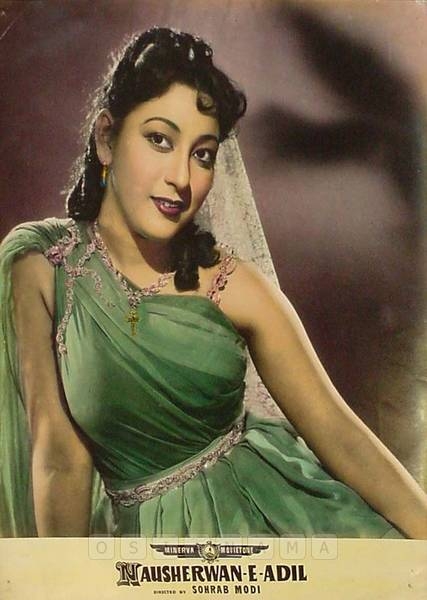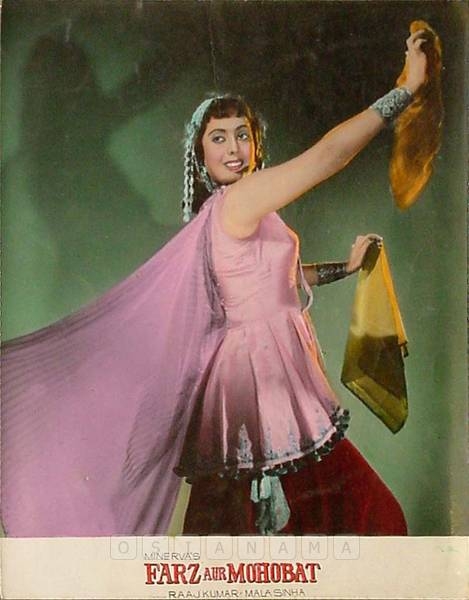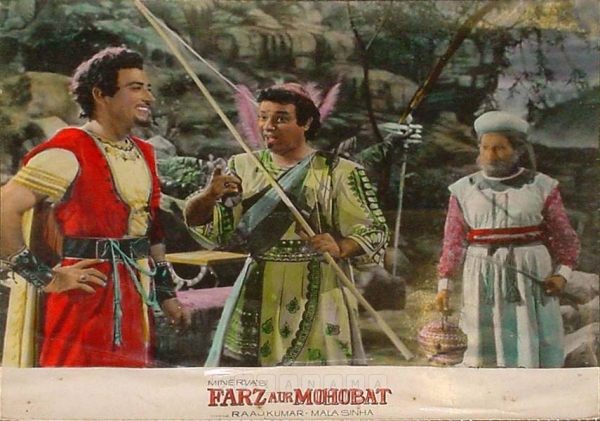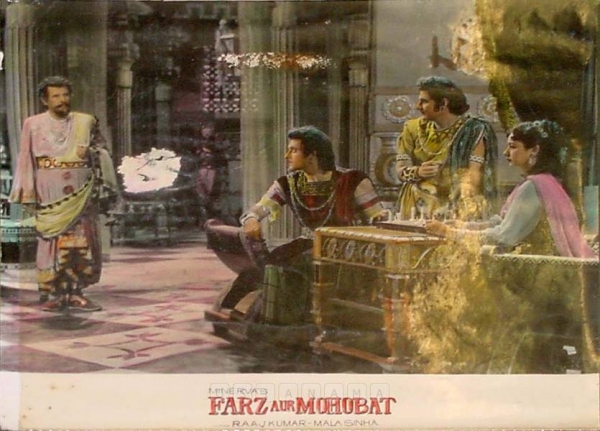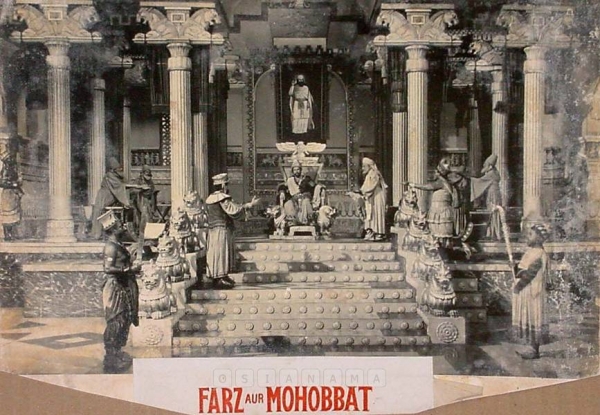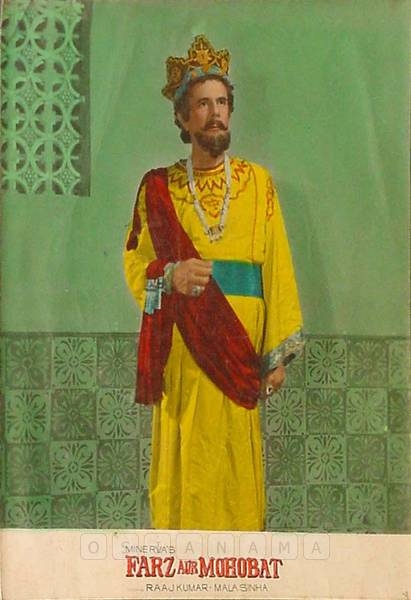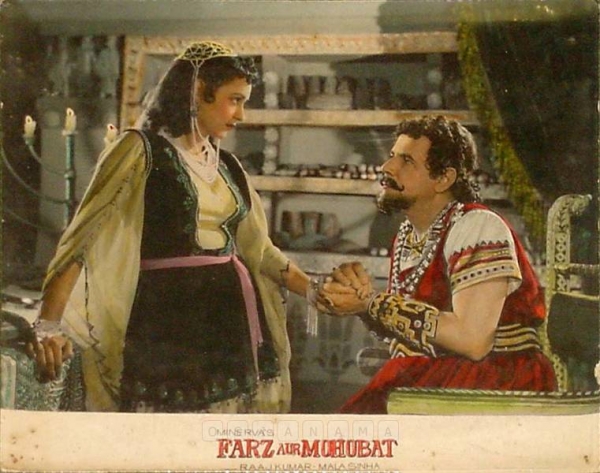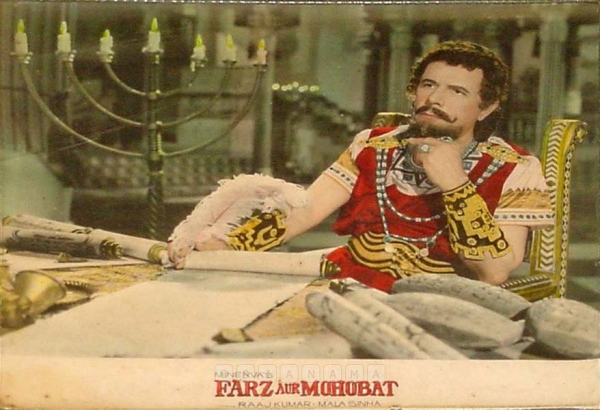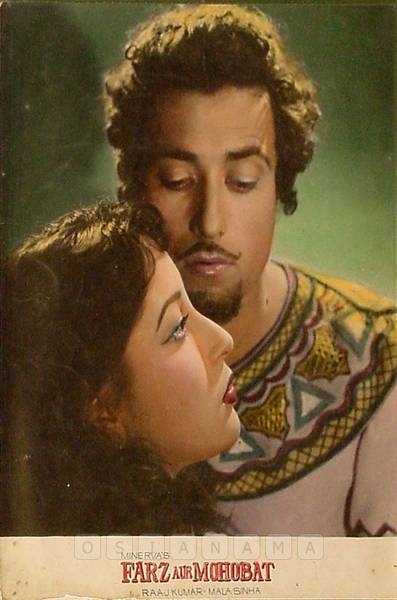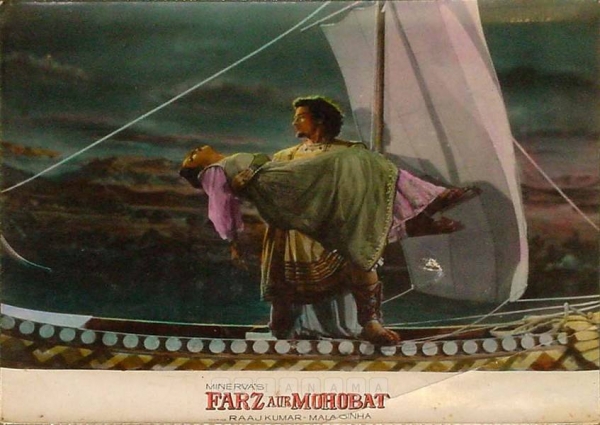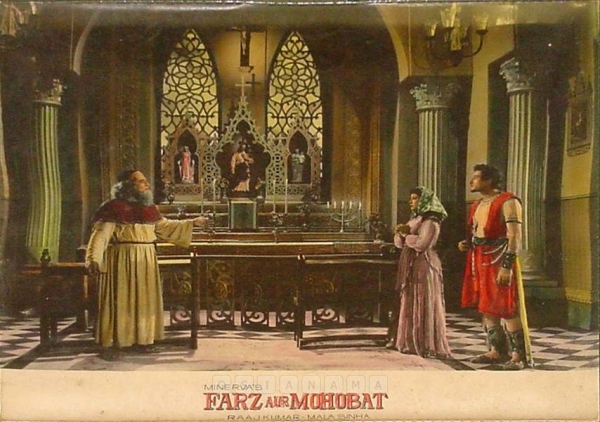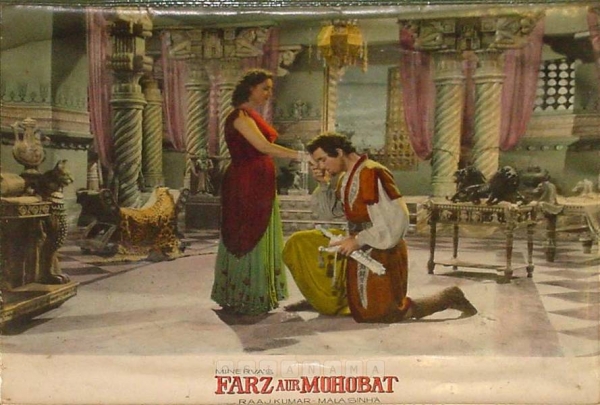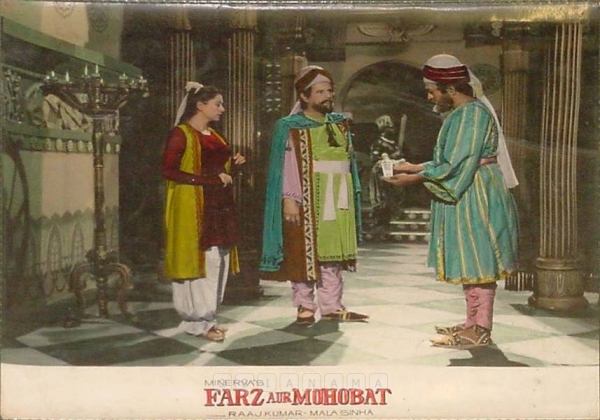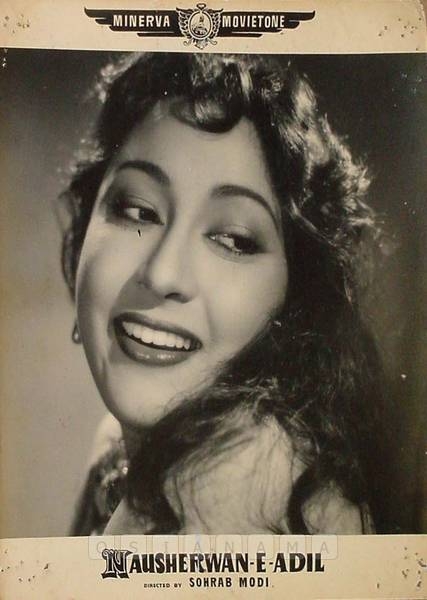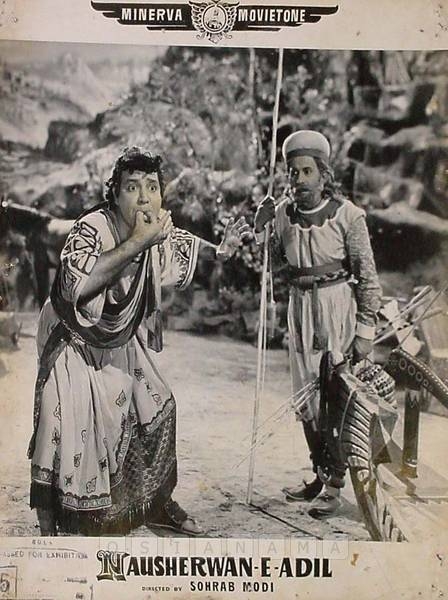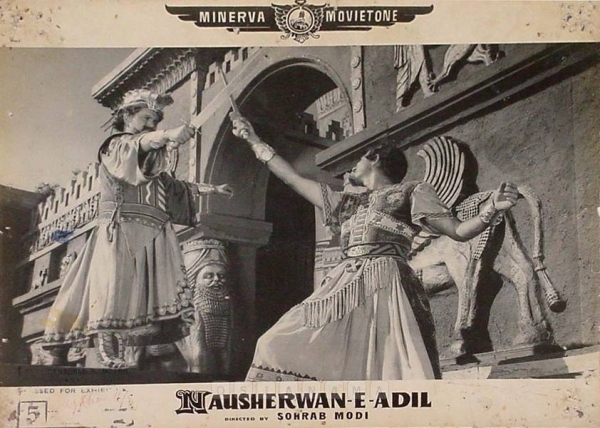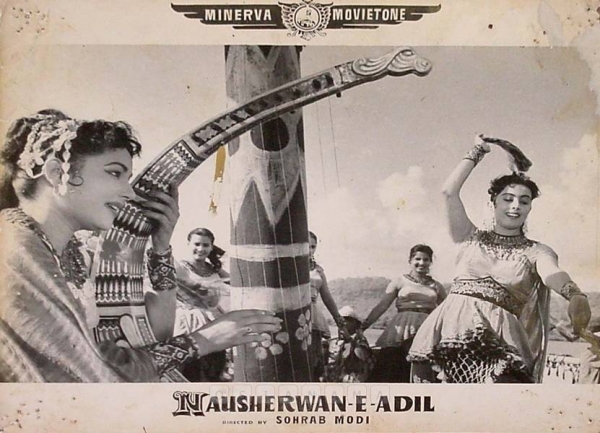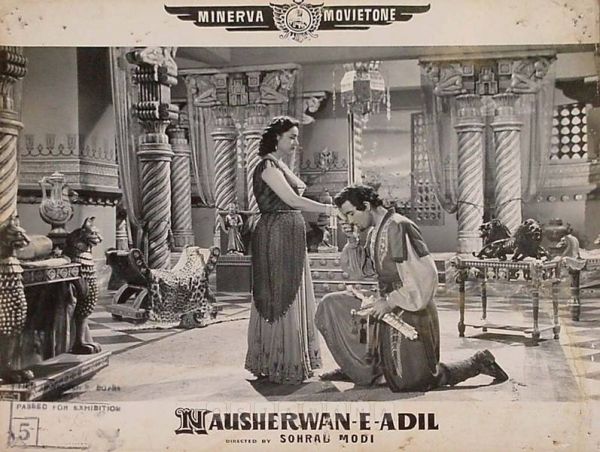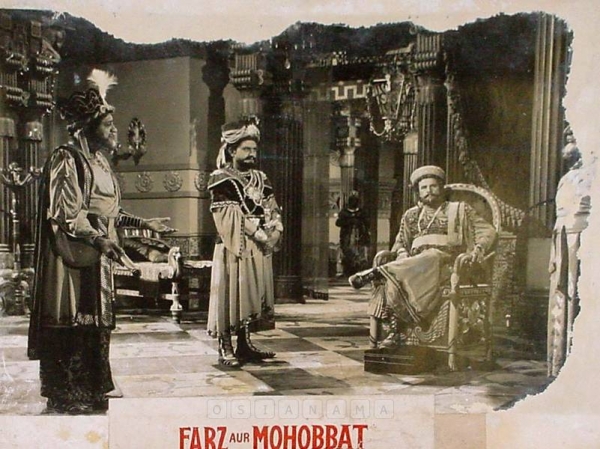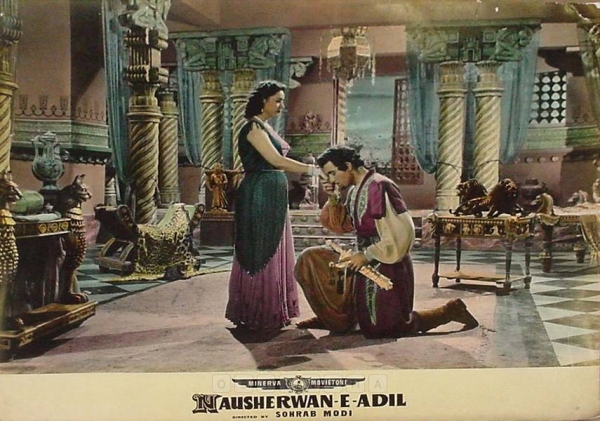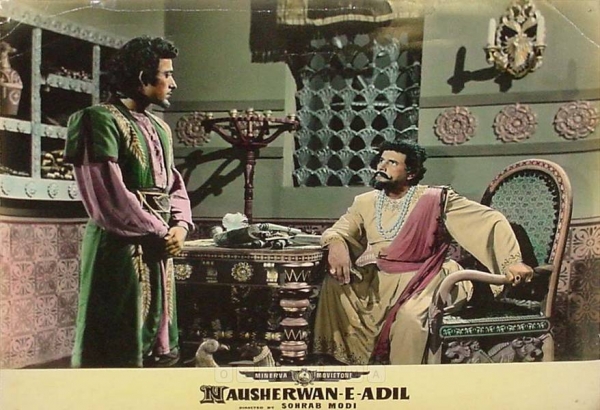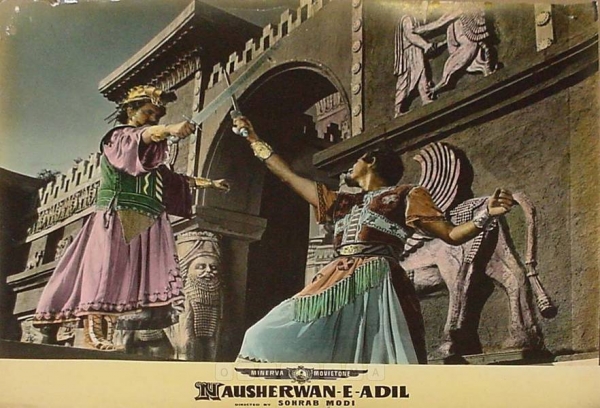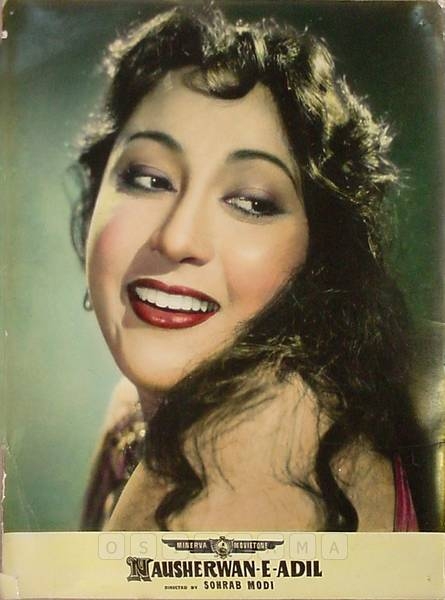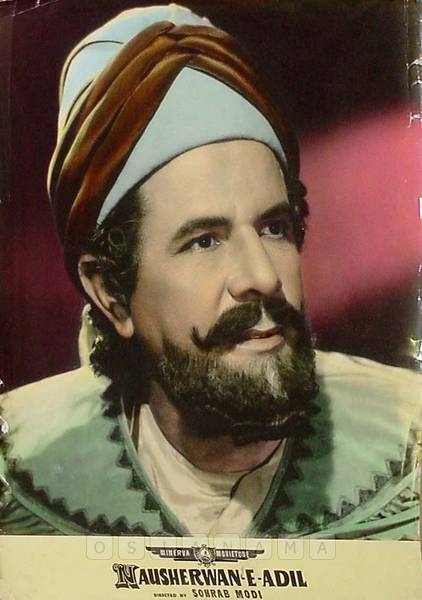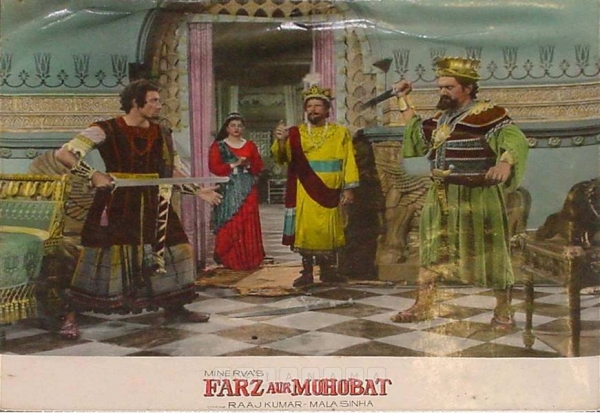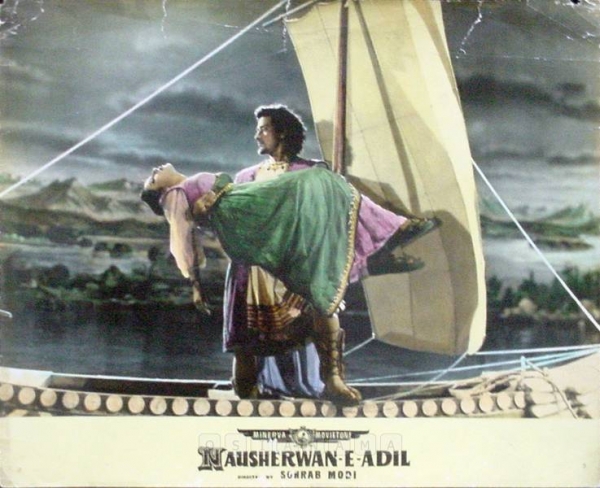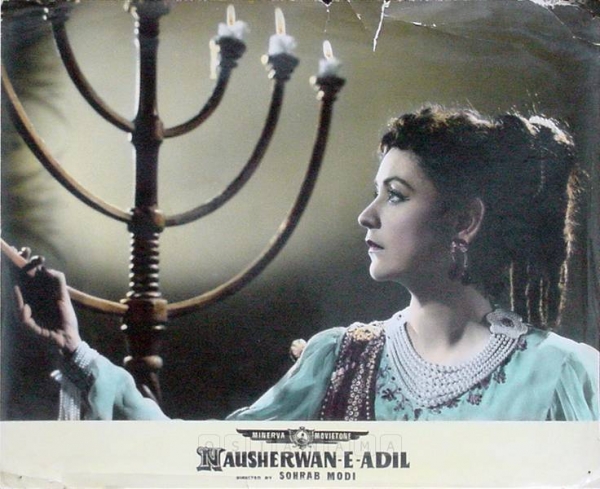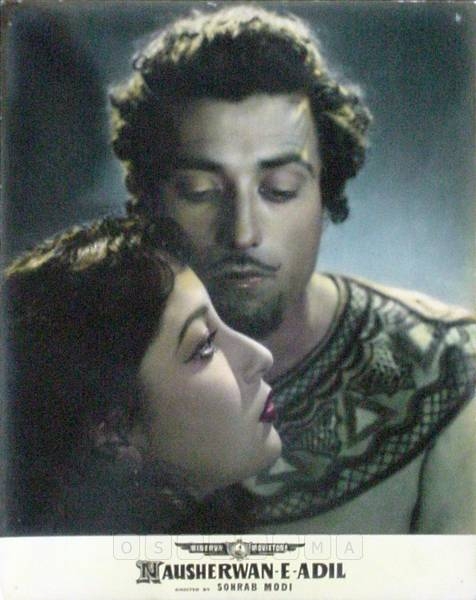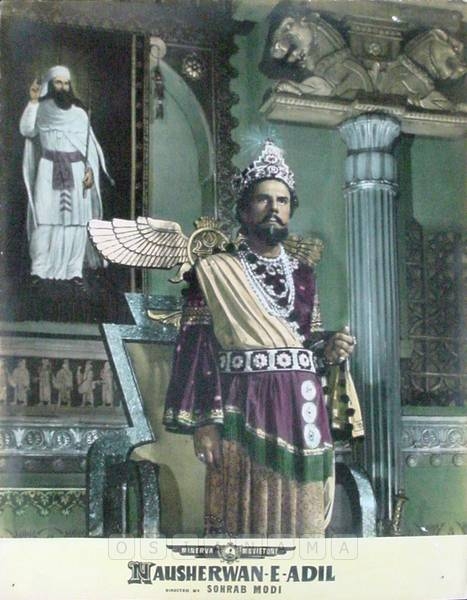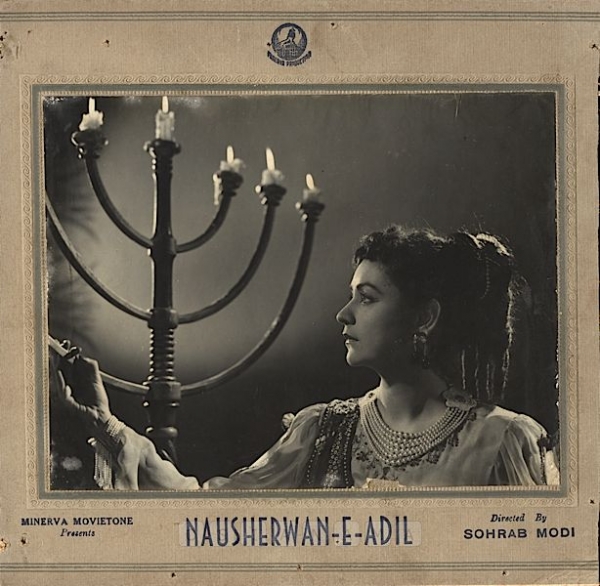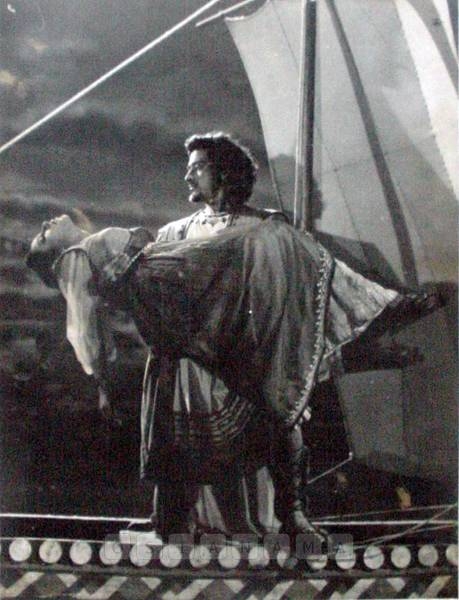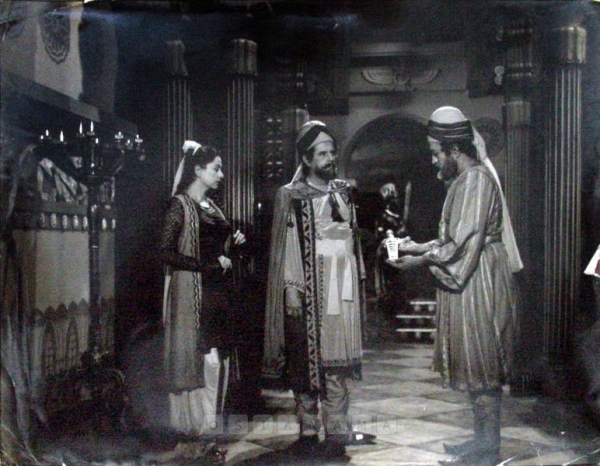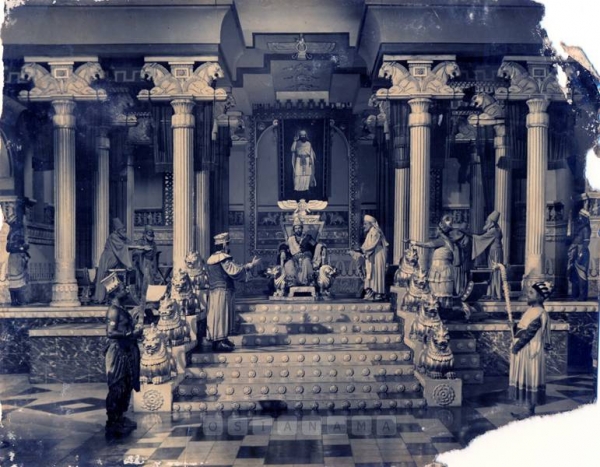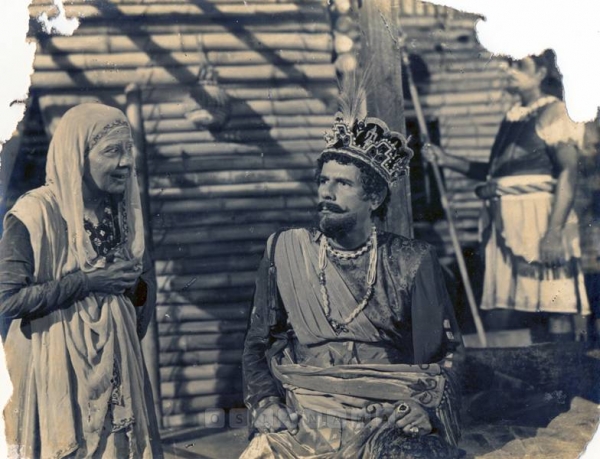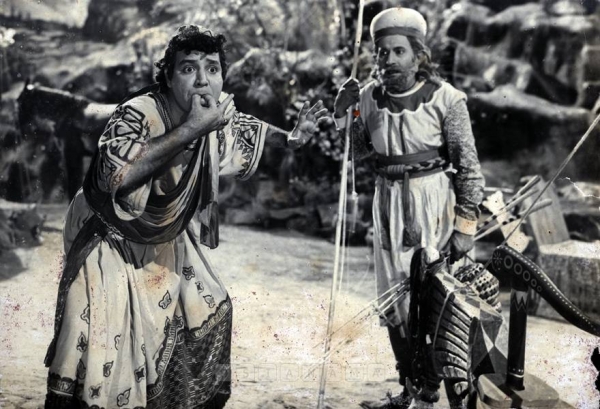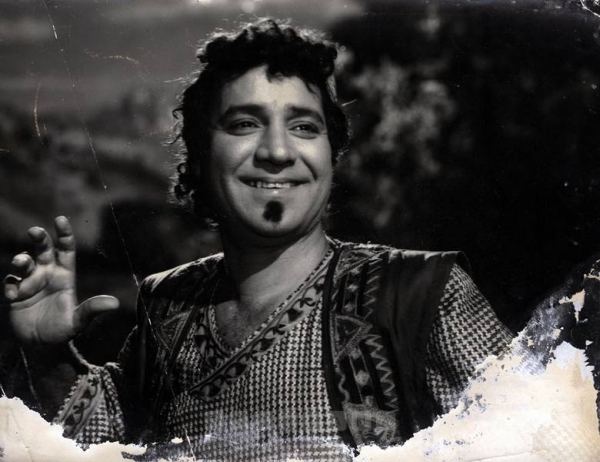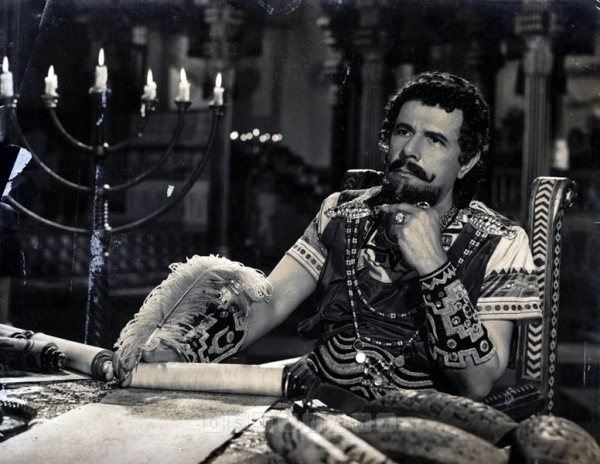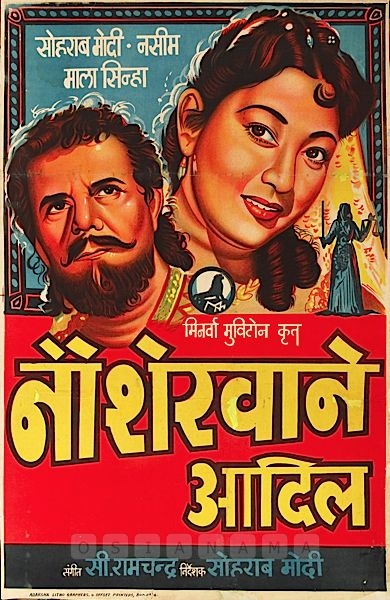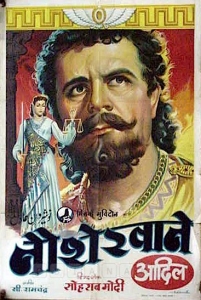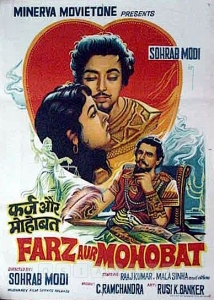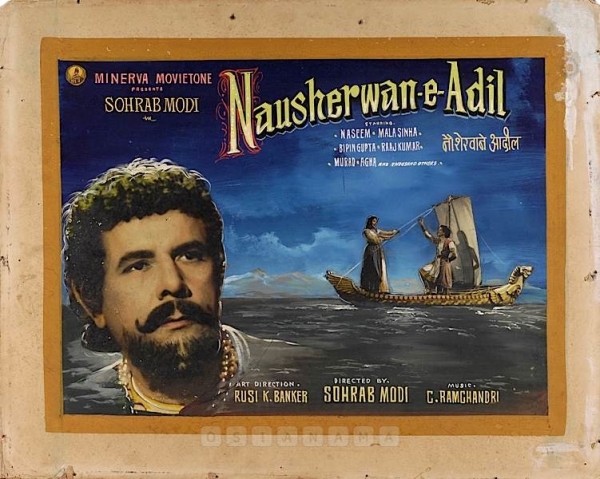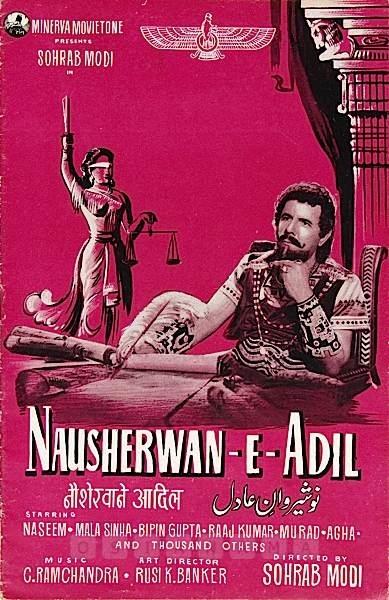| Nausherwan-E-Adil | Sohrab Modi | Raaj Kumar, Mala Sinha, Sohrab Modi, Naseem Bano, Murad, Agha, Shammi | Drama Action Adventure | Music: C. Ramchandra Lyrics: Parvez Shamsi |
.......
Nausherwan-E-Adil (1957) | Hindi Movie Review, Songs ...
muvyz.com/moviepage/ut244063
A fair-minded emperor improves and introduces new laws, but ends up facing challenges when his son violates them.
Director:
Sohrab ModiWriter:
Shams Lucknowi (story)Cast
| Cast overview: | |||
| Sohrab Modi |
Sultan-e-Iran Nausherwan-e-Adil
| ||
| Raaj Kumar |
Shehzada Naushazad / Joseph (as Raj Kumar)
| ||
| Mala Sinha |
Marcia
| ||
| Agha |
Altaf
| ||
| Bipin Gupta |
Hakim David
| ||
| Murad |
Ram Wazin
| ||
| Shammi |
Altaf's Wife
| ||
| Niranjan Sharma |
Wazir-eAala
| ||
| Film cast: | Raaj Kumar, Mala Sinha, Sohrab Modi, Naseem Banoo, Bipin Gupta, Murad, Shammi, Agha, Niranajan Sharma, Amir Bano |
| Singer: | Lata Mangeshkar, Mohammed Rafi, Asha Bhosle, Zohrabai Ambalewali, Chandbala |
| Lyricist: | Parvez Shamsi |
| Music Director: | C Ramchandra |
| Film Director: | Sohrab Modi |
Edit
Plot Summary | Add Synopsis
Storyline
Known for his fair-mindedness, Sulta-e-Iran Nausherwan-e-Adil, who lives with his wife, and two sons, administers justice to everyone regardless of their Majhab and status. He then sets forth incognito and finds out how his people are living, and returns back to the palace, and along with other law-makers, brings about changes in laws, improves upon them, as well as introduces new ones. He then proclaims that is now time to announce not only the introduction of new laws but also his son, Naushazad, who will succeed him. The laws are introduced and Naushazad is announced as as the future Sultan. Days after this ceremony his world will be turned upside down when Hakim David and his daughter, Marcia, will approach him and allege that Naushazad had violated laws, had used a fake Isahi name, Joseph, in order to woo Marcia, and demand punishment. Watch the impact this complaint has on the Sultan, his wife, and on his son. Written by rAjOo (gunwanti@hotmail.com)
Edit
See full technical specs »
People also watched
+6 more
Details
Country:
IndiaAlso Known As:
Nausherwan-E-Adil See more »Company Credits
Production Co:
Minerva Movietone See more »
Show detailed company contact information on IMDbPro »
Technical Specs
Runtime:
Sound Mix:
Mono (RCA Sound Recording)Color:
Black and WhiteSearch filters
People also watched
Nausherwan-E-Adil : Lyrics and video of Songs from the Movie ...
Lyrics and video of songs from Movie / Album : Nausherwan-E-Adil (1957); Music by: C Ramchandra; Singer(s): Lata Mangeshkar, Mohammed Rafi, Asha ...
-
Yeh Hasrat Thi Ke | Mohammed Rafi @ Nausherwan E Adil | Raaj Kumar, Mala Sinha3:44
-
Taaron Ki Zaban Par Hai | Lata Rafi @ Nausherwan E Adil | Raaj Kumar, Mala Sinha4:40
Nausherwan- E- Adil 1957 Mp3 Songs Free Download @ Webmusic ...
webmusic.in/hindi-movies-3703.htmlNausherwan- E- Adil Mp3 Songs, Download Nausherwan- E- Adil, Nausherwan- E-Adil ... Watch Nausherwan- E- Adil Full Movie Online download Video Songs.
-
Yeh Hasrat Thi Ke | Mohammed Rafi @ Nausherwan E Adil | Raaj Kumar, Mala Sinha
www.raaga.com/channels/hindi/moviedetail.asp?mid=h002441
Samsung TV. Nausherwan-E-Adil (1957). Music: C. Ramchandra. Cast: Sohrab Modi, Naseem Bano, Mala Sinha, Raj Kumar. Share Album: Link: Embed Album...
Nausherwan-E-Adil songs - Nausherwan-E-Adil 1957 Music Album ...
Songs from Nausherwan-E-Adil, Listen to Nausherwan-E-Adil songs online, Hindimovie soundtrack, year: 1957.Nausherwan-e-Adil Songs Lyrics (1957) - Hindi Songs Lyrics
Nausherwan-e-Adil songs lyrics, videos and movie trailer. Read lyrics and listen tosongs of Nausherwan-e-Adil which is a 1957 bollywood hindi film.
Hindi Film Songs - Nausherwan-E-Adil (1957) | MySwar
5+ items - Nausherwan-E-Adil (1957) by C. Ramchandra - Complete ...
Mashallah Mashallah (Yeh Nazakat Yeh Shabab)Asha Bhosle.Arabic.Mere Dard-E-Jigar Ki Har DhadkanAsha Bhosle ...Sufi/Qawwali.
- HD
Watch Nausherwan-E-Adil Movie Online,Nausherwan-E-Adil Movie ...
www.indopia.com/.../movie/1957010006.../nausher...
Nausherwan-E-Adil – Nausherwan-E-Adil available in indopia.com best Indian ... Movie : Nausherwan-E-Adil ...
TARON KI ZUBAN PAR HAI- RAFI- LATA-FILM- NAUSHERWAN E ADIL(1957)
MD-C RAMCHANDRA LYRICS-PARVEZ SHAMSI.
YEH HASRAT THI KI- RAFI- FILM- NAUSHERWAN E ADIL(1957) MD-C RAMCHANDRA LY-PARVEZ SHAMSI
MD-C RAMCHANDRA LYRICS-PARVEZ SHAMSI.
taaron ki zuban par hai ..f/m Nausherwan-E-Adil
Movie: Nausherwan-E-Adil (1957) Singer: Lata mangeshkar ,Mohammad Rafi sahab Music: C. Ramchandra Lyrics:Parvez shamsi ...
BHINI BHINI HAI MEETHI MEETHI HAI-LATA-FILM-NAUSHERWAN E ADIL(1957) MD-C RAMCHANDRA LY-PARVEZ SHAMSI
MD-C RAMCHANDRA LYRICS-PARVEZ SHAMSI.
Bhool Jaaye Saare Gam - Raaj Kumar - Mala Sinha - Nausherwa E Adil - Vintage Songs
Movie : Nausherwa - E - Adil Music Director: C Ramachandra Singer: Lata Mangeshkar, Mohammad Rafi Director: Sohrab Modi.
Ye Nazakath Ye Shabab by Asha Bhosle - Nausherwan-E-Adil (1957)
Subscribe to our Movies Heritage: http://goo.gl/0Ygl1z The story is about an unbiased ruler Nausherwan-E-Adil (Sohrab Modi) ...
BHOOL JAAYEN SAARE GHAM- LATA- RAFI- FILM- NAUSHERWAN E ADIL(1957)
MD-C RAMCHANDRA LYRICS-PARVEZ SHANSI.
Taron Ki Zuban Par Hai Muhabbat Ki Kahani - Nausherwan-E-Adil (1957)
Subscribe to our Movies Heritage: http://goo.gl/0Ygl1z The story is about an unbiased ruler Nausherwan-E-Adil (Sohrab Modi) ...
Nausherwan-E-Adil Hindi Movie | Full Movie | STARS Sohrab Modi, Mala Sinha, Raaj Kumar,
Nausherwan-E-Adil (Nausherwan, The Just) also called Farz Aur Mohabbat, is a 1957 costume action drama Hindi/Urdu film ...
Raat Dhalee, Jaan Chalee | Lata Mangeshkar | [FULL SONG] | Nausherwan-E-Adil (1957)
Subscribe to our Movies Heritage: http://goo.gl/0Ygl1z The story is about an unbiased ruler Nausherwan-E-Adil (Sohrab Modi) ...
2:26:57
Nausherwan-E-Adil | Hindi | full movie
Watch a dramatic movie Nausherwan-E-Adil of 1957 starring Sohrab Modi, Naseem, Mala Sinha, Raaj Kumar.
3:51
Yah Hasarat Thi Ke Is Duniyaa Men Bas Do Kaam Kar Jaate - Nausherwan-E-Adil (1957)
Subscribe to our Movies Heritage: http://goo.gl/0Ygl1z The story is about an unbiased ruler Nausherwan-E-Adil (Sohrab Modi) ...
3:57
Taaron Ki Jubaan Par Hai Mohabbat Ki Kahani - Mala Sinha - Nausherwa E Adil - Vintage Songs
Movie : Nausherwa - E - Adil Music Director: C Ramachandra Singer: Lata Mangeshkar, Mohammad Rafi Director: Sohrab Modi.
Raaj Kumar Mala Sinha Agha Bhool Jayen Sare Gham Lata & Rafi Nausherwan-E-Adil (1957) C Ramchandra / Parwaiz Shamsi..
3:22
Ye Nazakat Ye Aalam Shabaab Ka - Raaj Kumar - Mala Sinha - Nausherwa E Adil - Vintage Songs
Movie : Nausherwa - E - Adil Music Director: C Ramachandra Singer: Asha Bhosle Director: Sohrab Modi. Enjoy this superhit ...
3:05
Bheeni Bheeni Hai Meethi Meethi Hai - Mala Sinha - Nausherwa E Adil - Vintage Songs - Lata
Movie
: Nausherwa - E - Adil Music Director: C Ramachandra Singer: Lata
Mangeshkar Director: Sohrab Modi. Enjoy this superhit ...
3:52
ham aah bhi karte hain
Movie---Nausherwan-e-Adil Singer---Lata Mangeshkar Lyrics----Parvez Shamsi.
3:55
Raat Dhalee, Jaan Chalee | Lata Mangeshkar | [FULL SONG] | Nausherwan-E-Adil (1957)
Subscribe to our Movies Heritage: http://goo.gl/0Ygl1z The story is about an unbiased ruler Nausherwan-E-Adil (Sohrab Modi) ...
3:04
Kar Khushamad To Har Ek
Provided to YouTube by Sa Re Ga Ma Kar Khushamad To Har Ek · C Ramchandra NausherwanEAdil ℗ Saregama India Ltd ...
Mere Dard-e-Jigar Ki Har Dhadkan Asha Bhosle, Zohrabai Ambalewali, Chandbala
6:54
Mere Dard E Jigar Ki Har Dhadkan - Nausherwan-E-Adil (1957) - HIT SONGS
Subscribe to our Movies Heritage: http://goo.gl/0Ygl1z The story is about an unbiased ruler Nausherwan-E-Adil (Sohrab Modi) ...
.........................................................................................................
Nov 11, 2012 - The film's main title is Farz aur Mohabbat (the 'Navsherwan-e-Adil' is ... fact that Nausherwan is appropriately referred to as 'the Just', the story ..
Today, November 11, is the birthday of Mala Sinha, so I decided to
finally watch this film—not because it’s one of her best, but because it
has three elements I’m partial to: it has music by C Ramachandra, it’s a
historical, and it stars Mala Sinha.
I have to admit my love for Mala Sinha sees ups and downs, based on which film I’m watching. In a film like Pyaasa or Gumraah, where she has good roles (and good directors), she shows just how good an actress she is. And in an all-out entertainer like Aankhen, she’s equally unforgettable as the feisty, glamorous spy. These are the films I prefer to stuff like Anpadh, Hariyali aur Raasta, or even Baharein Phir Bhi Aayengi—because the melodrama is kept in check.
But one thing I’ll happily admit: I think Mala Sinha is lovely, and I’ll watch most films just to see her.

Anyway: to get back to Nausherwan-e-Adil (spelt Navsherwan-e-Adil, in the film’s credits). The film’s main title is Farz aur Mohabbat (the ‘Navsherwan-e-Adil’ is listed as an ‘alias’). That should give you an idea of what this is all about: the struggle between duty on the one hand and love on the other.
We begin in the court of the Iranian emperor Nausherwan the Just (or, in Urdu, ‘Nausherwan-e-adil’; Sohrab Modi). A young Jewish woman, along with her parents, has come to Nausherwan’s court, pleading for justice. She complains that a young man (also present) duped her into a romance, all the while telling her that he too was a Jew. Now it turns out he’s actually a Christian [the poor guy’s tunic is ripped open, so all can see the cross tattooed on his chest—cool!]…

…and the girl, thoroughly miffed, wants retribution for having been thus deceived.
Nausherwan doesn’t take much time to give a judgment: the young man is to be walled up alive.

Just as the prisoner’s being taken away, in comes David (Bipin Gupta), a Christian priest and physician, who lives far away from the city and is a recluse. [Also a bit of a crackpot, as is later revealed. Living far removed from society does that, occasionally].
David opposes the verdict and asks Nausherwan on what basis he’s sentenced the young man to such a hideous death.

Nausherwan’s right-hand men leap to his defence, saying that this is the law of Iran; how can David question it?
This prompts David to ask another question: where is this law written? More discomfiture and more blustering follow, until Nausherwan is forced to admit that this is the traditional punishment meted out to such miscreants.
He also realises that David has a point; unless a law is codified, it can’t be justifiably implemented. So Nausherwan has to let the young man go free, but compensates the wronged girl by imposing a hefty fine on the man, leaving him bankrupt.

Nausherwan now gives instructions to his wazir (Niranjan Sharma) to start drafting laws to deal with situations such as this. The wazir and the head priest (?) try to persuade Nausherwan that it’s unnecessary; Iran is a grand country, all the people are very happy, and there’s no need to change anything. [I suspect these two are simply trying to get out of doing any work].
Nausherwan seems to harbour similar suspicions, and tells them to get down to it.

He also decides that it’s time he went out, incognito [now where have I come across that before?] to see exactly how happy [or not] his subjects are.
Having established the fact that Nausherwan is appropriately referred to as ‘the Just’, the story moves on to his family. This consists of his wife (Naseem Bano, Saira Bano’s mum—and, if you pay close attention, you can actually notice a resemblance in features and tone), and his two sons. The elder son (and heir) is Naushahzaad (Raj Kumar); the younger son, Naushahzaad’s stepbrother, is Hormuzd [? Nobody I recognised, which is just as well—he disappears after this scene, and reappears only briefly at the end].

Naushahzaad is the main guy, and it’s on him that the story focusses. Our prince is a fun-loving person, who likes to spend time hunting and fishing with his companion/servant/general hanger-around, Askaf [Agha, who, with a curly wig, looks uncannily like Jalal Agha in some scenes].

One day, Naushahzaad and Askaf are beside a body of water (it’s not very clear whether it’s a river, a lake, or the sea), when they see a woman (Mala Sinha) floating by, seemingly dead, on what looks like a makeshift raft. [Somewhat Ophelia-esque—a coincidence, since Mala Sinha played Hamlet’s doomed girlfriend back in Hamlet, 1954].

Naushahzaad and Askaf fish her out, and Naushahzaad is smitten at first glance.

The pretty lady’s on the brink of death [to be precise, there’s no pulse], but Naushahzaad isn’t giving up easily. He and Askaf quickly row her across to the nearest physician they know of—who turns out to be David, the reclusive Christian priest. David tells the two men to get lost—and take the girl with them.
“I hate people from the city,” he tells his visitors, while asking Naushahzaad his name.

Naushahzaad, trying to ingratiate himself with the curmudgeonly David, says his name’s Joseph; he’s a Christian.
After much persuasion and pleading, David agrees to examine the ‘dead’ girl. He discovers that the girl’s pulse is there, but very weak, because she’s gone stone cold from her dunking in the water all this while. The three men pile blankets on her, light braziers, and soon enough, she gains consciousness. [It beats me how she’s survived all this while].

After a preliminary “Main kahaan hoon?” she says that her name is Marcia, and she was on her way with her mother to be united with her long-lost father. They were caught in a frightful storm, which has claimed Mummy and left Marcia here. She shows the crucifix that once belonged to her father—and oh! The coincidence!—David recognises it.
This was the crucifix that he had given his wife years ago, before she left him in a huff, along with their six-month old daughter.

[We never get to hear what David was guilty of for his wife to have been so miffed. As the film progresses, though, I’m not really surprised she did].
From there, it’s a short leap to “My daughter!”, “Father!”, and many tears of joy. [Nobody thinks to shed any tears for Marcia’s dead mum].
So Marcia is reunited with her father, and falls in love with ‘Joseph’, simultaneously.
Everyone’s very happy, and Marcia and Naushahzaad, unknown to their respective parents, spend all their evenings singing and making promises of ever-lasting love to each other.
Naushahzaad [perhaps lacking a little foresight?] doesn’t tell Marcia who he really is.

Meanwhile, Nausherwan has been going about in disguise at night, seeing how his people live, and discovering for himself that life isn’t quite as equable and jolly as the wazir & Co. think. Nausherwan makes his own decisions about improving life for the poor, even going so far as to order the sipahsalar, the commander (Murad) to have the outer wall of the citadel altered so that an old woman whose hut stands nearby doesn’t have to leave the home she’s always lived in.

Eventually, after much deliberation, Nausherwan and his advisers come up with two new laws:
(a) Any man who deceives a maiden [rather a vague term. “kunwaari ladki ko dhokha dena” is the phrase used] will be walled up alive.
(b) Any man who deceives the state will be imprisoned for life

One evening, the queen stops Nausherwan just as he’s setting out on another incognito excursion into town. She wants to go along with him, and Nausherwan is happy to have her accompany him.

As it happens, this is the same night that Askaf has been told repeatedly by Naushahzaad that he is to tell no-one at all, not even his wife (Shammi), about Naushahzaad’s love for Marcia. It must remain a secret.
Askaf’s having a hard time keeping mum, and is itching to tell someone. Finally, when he can’t hold it in any more, he blabbers it all out—to his pony. Unfortunately, he doesn’t realise that the king and queen, seated on their horses, are just behind him, and have heard every word.

Nausherwan is very displeased; the heir to the throne should be learning the ropes, not gallivanting around romancing the local women.
The same night, David—having woken up suddenly and discovered that Marcia’s nowhere to be found at home, sees her out boating with ‘Joseph’. When her boyfriend finally says good night and leaves Marcia on the shore, David approaches and gives her a talking-to.
Marcia’s protests that her relationship with Joseph is pure, and that David should at least trust his own daughter, make him eventually relent. He suggests a wedding, and Marcia is thrilled to bits.

Nausherwan isn’t quite so easily appeased [possibly because Naushahzaad doesn’t get a chance to talk about his love for Marcia]. Daddy reads the riot act to Naushahzaad: he’s been neglecting his duties, not showing up at court, not even coming to the prayer house. What is this, pray?
Naushahzaad had better clean up his act, Naushwerwan tells him imperiously. Come daily to the temple for prayers. And no stepping out of the palace without Daddy’s express permission.

Ouch.
The queen is present throughout the conversation, and realises (as does Nausherwan himself) that her son resents this diktat. When Naushahzaad leaves, Nausherwan requests his wife to go and reason with him.
The queen agrees, and is confronted by an irate son, who tells his mother that he doesn’t mind having to seek his father’s permission to go out—what riles him is the order to join Nausherwan in daily prayers.

Why, asks the surprised queen. “Because I’m a Christian,” says Naushahzaad. [This comes as a surprise to her, and to me. His pretending to be the Christian Joseph seemed to be only a masquerade, but this is serious stuff].
Now comes another surprise: it emerges that the queen herself is a Christian. [Well, Naushahzaad knew that, but it’s a revelation for us]. When Naushahzaad says, “If the queen of Iran can be a Christian, why can’t I?” she replies that the king of Iran—which Naushahzaad will one day be—can only be of the Iranian [I’m guessing this means Zoroastrian] faith.

His mother explains that when she married Nausherwan, she had to agree to the condition that their children would be brought up in the Iranian faith. If Nausherwan now discovers that Naushahzaad is a Christian, he’ll think the queen has betrayed his trust in her. It’s a matter of her honour, she says. Please, for the sake of your mother, keep your religion a secret. When Naushahzaad eventually becomes king, he can do as he pleases, but till then, he must not breathe a word about his being a Christian.

Naushahzaad agrees, albeit reluctantly.
And here arises a problem. Marcia and David know him to be a Christian [they don’t even know he’s the prince, but never mind that for now]. Except for his mother, everybody else thinks he’s an adherent of the Iranian faith.
And there are those two potentially-dangerous laws that have been drafted…

I am a lover of historical films, even the faux historicals, with facts thrown to the winds and wild flights of fancy ruling the screenplay. This one probably had as little to do with fact as did Jahanara or Shahjehan, but I still liked it.
What I liked about this film:
The cast. Sohrab Modi (who, as my father says, delivered his speeches as if “he was declaiming to the skies”) is rather more restrained and natural here. Mala Sinha is especially pretty, and in a refreshing departure from the usual
hystericalhistorical female, shows she’s got backbone when it’s most needed. Not a kickass heroine, but a loyal and courageous one.
And—surprise, surprise—Raj Kumar. I’ve made no bones about the fact that Raj Kumar is one actor I can’t stomach. Here, he was surprisingly good, and looked pretty smart (despite the beard—or possibly because of it?).

C Ramachandra’s music. Three songs, in particular, stand out: the oft-repeated Taaron ki zabaan par hai mohabbat ki kahaani, Bhool jaayein saare gham doob jaayein pyaar mein; and the sad Yeh hasrat thhi ke is duniya mein bas do kaam kar jaate. All superb.
What I didn’t like:
The end. Logically, it made sense; the escapist me didn’t like it.
I have to confess: I’d wanted to watch Nausherwan-e-Adil mainly for the songs and for Mala Sinha. I hadn’t expected a film in which I’d find other elements to like—the costumes and art, for example, look rather authentic; the acting is mostly good; and the story is a simple, uncluttered one of the tussle between love (and not just romantic love) on the one hand, and duty on the other. Watchable enough.
Little bit of trivia:
Nausherwan-e-Adil (formally, Khosrau I) was a real man, the most famous of the Sassanid rulers of Persia. I couldn’t find any evidence that his queen was Christian, but interestingly enough, his grandson, Khosrau II, was married to a Nestorian Christian woman named Shirin. Their story, the romance of Khosrau and Shirin, formed the basis for the legendary love (also beloved of Hindi cinema) of Shirin and Farhad.
Happy birthday, Mala Sinha!
.........................................................................................................
Nausherwan-e-Adil (1957) | Dustdoff
madhulikaliddle.com/2012/11/11/nausherwan-e-adil-1957/
Nausherwan-e-Adil (1957)
56
I have to admit my love for Mala Sinha sees ups and downs, based on which film I’m watching. In a film like Pyaasa or Gumraah, where she has good roles (and good directors), she shows just how good an actress she is. And in an all-out entertainer like Aankhen, she’s equally unforgettable as the feisty, glamorous spy. These are the films I prefer to stuff like Anpadh, Hariyali aur Raasta, or even Baharein Phir Bhi Aayengi—because the melodrama is kept in check.
But one thing I’ll happily admit: I think Mala Sinha is lovely, and I’ll watch most films just to see her.
Anyway: to get back to Nausherwan-e-Adil (spelt Navsherwan-e-Adil, in the film’s credits). The film’s main title is Farz aur Mohabbat (the ‘Navsherwan-e-Adil’ is listed as an ‘alias’). That should give you an idea of what this is all about: the struggle between duty on the one hand and love on the other.
We begin in the court of the Iranian emperor Nausherwan the Just (or, in Urdu, ‘Nausherwan-e-adil’; Sohrab Modi). A young Jewish woman, along with her parents, has come to Nausherwan’s court, pleading for justice. She complains that a young man (also present) duped her into a romance, all the while telling her that he too was a Jew. Now it turns out he’s actually a Christian [the poor guy’s tunic is ripped open, so all can see the cross tattooed on his chest—cool!]…
…and the girl, thoroughly miffed, wants retribution for having been thus deceived.
Nausherwan doesn’t take much time to give a judgment: the young man is to be walled up alive.
Just as the prisoner’s being taken away, in comes David (Bipin Gupta), a Christian priest and physician, who lives far away from the city and is a recluse. [Also a bit of a crackpot, as is later revealed. Living far removed from society does that, occasionally].
David opposes the verdict and asks Nausherwan on what basis he’s sentenced the young man to such a hideous death.
Nausherwan’s right-hand men leap to his defence, saying that this is the law of Iran; how can David question it?
This prompts David to ask another question: where is this law written? More discomfiture and more blustering follow, until Nausherwan is forced to admit that this is the traditional punishment meted out to such miscreants.
He also realises that David has a point; unless a law is codified, it can’t be justifiably implemented. So Nausherwan has to let the young man go free, but compensates the wronged girl by imposing a hefty fine on the man, leaving him bankrupt.
Nausherwan now gives instructions to his wazir (Niranjan Sharma) to start drafting laws to deal with situations such as this. The wazir and the head priest (?) try to persuade Nausherwan that it’s unnecessary; Iran is a grand country, all the people are very happy, and there’s no need to change anything. [I suspect these two are simply trying to get out of doing any work].
Nausherwan seems to harbour similar suspicions, and tells them to get down to it.
He also decides that it’s time he went out, incognito [now where have I come across that before?] to see exactly how happy [or not] his subjects are.
Having established the fact that Nausherwan is appropriately referred to as ‘the Just’, the story moves on to his family. This consists of his wife (Naseem Bano, Saira Bano’s mum—and, if you pay close attention, you can actually notice a resemblance in features and tone), and his two sons. The elder son (and heir) is Naushahzaad (Raj Kumar); the younger son, Naushahzaad’s stepbrother, is Hormuzd [? Nobody I recognised, which is just as well—he disappears after this scene, and reappears only briefly at the end].
Naushahzaad is the main guy, and it’s on him that the story focusses. Our prince is a fun-loving person, who likes to spend time hunting and fishing with his companion/servant/general hanger-around, Askaf [Agha, who, with a curly wig, looks uncannily like Jalal Agha in some scenes].
One day, Naushahzaad and Askaf are beside a body of water (it’s not very clear whether it’s a river, a lake, or the sea), when they see a woman (Mala Sinha) floating by, seemingly dead, on what looks like a makeshift raft. [Somewhat Ophelia-esque—a coincidence, since Mala Sinha played Hamlet’s doomed girlfriend back in Hamlet, 1954].
Naushahzaad and Askaf fish her out, and Naushahzaad is smitten at first glance.
The pretty lady’s on the brink of death [to be precise, there’s no pulse], but Naushahzaad isn’t giving up easily. He and Askaf quickly row her across to the nearest physician they know of—who turns out to be David, the reclusive Christian priest. David tells the two men to get lost—and take the girl with them.
“I hate people from the city,” he tells his visitors, while asking Naushahzaad his name.
Naushahzaad, trying to ingratiate himself with the curmudgeonly David, says his name’s Joseph; he’s a Christian.
After much persuasion and pleading, David agrees to examine the ‘dead’ girl. He discovers that the girl’s pulse is there, but very weak, because she’s gone stone cold from her dunking in the water all this while. The three men pile blankets on her, light braziers, and soon enough, she gains consciousness. [It beats me how she’s survived all this while].
After a preliminary “Main kahaan hoon?” she says that her name is Marcia, and she was on her way with her mother to be united with her long-lost father. They were caught in a frightful storm, which has claimed Mummy and left Marcia here. She shows the crucifix that once belonged to her father—and oh! The coincidence!—David recognises it.
This was the crucifix that he had given his wife years ago, before she left him in a huff, along with their six-month old daughter.
[We never get to hear what David was guilty of for his wife to have been so miffed. As the film progresses, though, I’m not really surprised she did].
From there, it’s a short leap to “My daughter!”, “Father!”, and many tears of joy. [Nobody thinks to shed any tears for Marcia’s dead mum].
So Marcia is reunited with her father, and falls in love with ‘Joseph’, simultaneously.
Everyone’s very happy, and Marcia and Naushahzaad, unknown to their respective parents, spend all their evenings singing and making promises of ever-lasting love to each other.
Naushahzaad [perhaps lacking a little foresight?] doesn’t tell Marcia who he really is.
Meanwhile, Nausherwan has been going about in disguise at night, seeing how his people live, and discovering for himself that life isn’t quite as equable and jolly as the wazir & Co. think. Nausherwan makes his own decisions about improving life for the poor, even going so far as to order the sipahsalar, the commander (Murad) to have the outer wall of the citadel altered so that an old woman whose hut stands nearby doesn’t have to leave the home she’s always lived in.
Eventually, after much deliberation, Nausherwan and his advisers come up with two new laws:
(a) Any man who deceives a maiden [rather a vague term. “kunwaari ladki ko dhokha dena” is the phrase used] will be walled up alive.
(b) Any man who deceives the state will be imprisoned for life
One evening, the queen stops Nausherwan just as he’s setting out on another incognito excursion into town. She wants to go along with him, and Nausherwan is happy to have her accompany him.
As it happens, this is the same night that Askaf has been told repeatedly by Naushahzaad that he is to tell no-one at all, not even his wife (Shammi), about Naushahzaad’s love for Marcia. It must remain a secret.
Askaf’s having a hard time keeping mum, and is itching to tell someone. Finally, when he can’t hold it in any more, he blabbers it all out—to his pony. Unfortunately, he doesn’t realise that the king and queen, seated on their horses, are just behind him, and have heard every word.
Nausherwan is very displeased; the heir to the throne should be learning the ropes, not gallivanting around romancing the local women.
The same night, David—having woken up suddenly and discovered that Marcia’s nowhere to be found at home, sees her out boating with ‘Joseph’. When her boyfriend finally says good night and leaves Marcia on the shore, David approaches and gives her a talking-to.
Marcia’s protests that her relationship with Joseph is pure, and that David should at least trust his own daughter, make him eventually relent. He suggests a wedding, and Marcia is thrilled to bits.
Nausherwan isn’t quite so easily appeased [possibly because Naushahzaad doesn’t get a chance to talk about his love for Marcia]. Daddy reads the riot act to Naushahzaad: he’s been neglecting his duties, not showing up at court, not even coming to the prayer house. What is this, pray?
Naushahzaad had better clean up his act, Naushwerwan tells him imperiously. Come daily to the temple for prayers. And no stepping out of the palace without Daddy’s express permission.
Ouch.
The queen is present throughout the conversation, and realises (as does Nausherwan himself) that her son resents this diktat. When Naushahzaad leaves, Nausherwan requests his wife to go and reason with him.
The queen agrees, and is confronted by an irate son, who tells his mother that he doesn’t mind having to seek his father’s permission to go out—what riles him is the order to join Nausherwan in daily prayers.
Why, asks the surprised queen. “Because I’m a Christian,” says Naushahzaad. [This comes as a surprise to her, and to me. His pretending to be the Christian Joseph seemed to be only a masquerade, but this is serious stuff].
Now comes another surprise: it emerges that the queen herself is a Christian. [Well, Naushahzaad knew that, but it’s a revelation for us]. When Naushahzaad says, “If the queen of Iran can be a Christian, why can’t I?” she replies that the king of Iran—which Naushahzaad will one day be—can only be of the Iranian [I’m guessing this means Zoroastrian] faith.
His mother explains that when she married Nausherwan, she had to agree to the condition that their children would be brought up in the Iranian faith. If Nausherwan now discovers that Naushahzaad is a Christian, he’ll think the queen has betrayed his trust in her. It’s a matter of her honour, she says. Please, for the sake of your mother, keep your religion a secret. When Naushahzaad eventually becomes king, he can do as he pleases, but till then, he must not breathe a word about his being a Christian.
Naushahzaad agrees, albeit reluctantly.
And here arises a problem. Marcia and David know him to be a Christian [they don’t even know he’s the prince, but never mind that for now]. Except for his mother, everybody else thinks he’s an adherent of the Iranian faith.
And there are those two potentially-dangerous laws that have been drafted…
I am a lover of historical films, even the faux historicals, with facts thrown to the winds and wild flights of fancy ruling the screenplay. This one probably had as little to do with fact as did Jahanara or Shahjehan, but I still liked it.
What I liked about this film:
The cast. Sohrab Modi (who, as my father says, delivered his speeches as if “he was declaiming to the skies”) is rather more restrained and natural here. Mala Sinha is especially pretty, and in a refreshing departure from the usual
And—surprise, surprise—Raj Kumar. I’ve made no bones about the fact that Raj Kumar is one actor I can’t stomach. Here, he was surprisingly good, and looked pretty smart (despite the beard—or possibly because of it?).
C Ramachandra’s music. Three songs, in particular, stand out: the oft-repeated Taaron ki zabaan par hai mohabbat ki kahaani, Bhool jaayein saare gham doob jaayein pyaar mein; and the sad Yeh hasrat thhi ke is duniya mein bas do kaam kar jaate. All superb.
What I didn’t like:
The end. Logically, it made sense; the escapist me didn’t like it.
I have to confess: I’d wanted to watch Nausherwan-e-Adil mainly for the songs and for Mala Sinha. I hadn’t expected a film in which I’d find other elements to like—the costumes and art, for example, look rather authentic; the acting is mostly good; and the story is a simple, uncluttered one of the tussle between love (and not just romantic love) on the one hand, and duty on the other. Watchable enough.
Little bit of trivia:
Nausherwan-e-Adil (formally, Khosrau I) was a real man, the most famous of the Sassanid rulers of Persia. I couldn’t find any evidence that his queen was Christian, but interestingly enough, his grandson, Khosrau II, was married to a Nestorian Christian woman named Shirin. Their story, the romance of Khosrau and Shirin, formed the basis for the legendary love (also beloved of Hindi cinema) of Shirin and Farhad.
Happy birthday, Mala Sinha!
Nausherwan E Adil - Osianama
Nausherwan E Adil 1957 directed by Sohrab Modi starring.
pos of film Nausherwan E Adil 1957 directed by featuring Bipin Gupta Mala Sinha Naseem Sohrab Modi, Agha Murad Raaj Kumar.
phl of film Nausherwan E Adil 1957 directed by featuring Bipin Gupta Mala Sinha Naseem Sohrab Modi, Agha Murad Raaj Kumar.
ssb of film Nausherwan E Adil 1957 directed by featuring Bipin Gupta Mala Sinha Naseem Sohrab Modi, Agha Murad Raaj Kumar.
lbp of film Nausherwan E Adil 1957 directed by featuring Bipin Gupta Mala Sinha Naseem Sohrab Modi, Agha Murad Raaj Kumar.
pho of film Nausherwan E Adil 1957 directed by featuring Bipin Gupta Mala Sinha Naseem Sohrab Modi, Agha Murad Raaj Kumar.
Total Results
42






